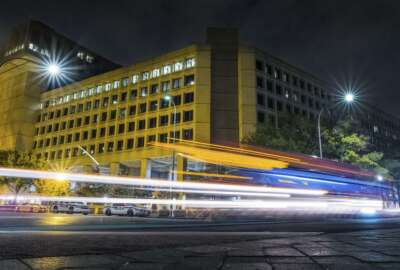
Future FBI headquarters coming to Greenbelt, Maryland, GSA decides
A decade-long disagreement over where to build a new headquarters for the FBI is now settled. Federal officials confirmed Wednesday night that the General Services...
The Biden administration is putting an end to a decade-long disagreement over where to build a new headquarters for the FBI.
The FBI in the coming years will relocate its headquarters to the D.C. suburbs in Greenbelt, Maryland.
The General Services Administration confirmed Wednesday night that the selected Greenbelt as the future home of the FBI headquarters.
However, the FBI director and Virginia lawmakers are calling GSA’s decision-making process into question, likely adding further delays to the project.
A GSA spokesperson told Federal News Network that GSA “determined Greenbelt to be the best site, because it was the lowest cost to taxpayers, provided the greatest transportation access to FBI employees and visitors, and gave the government the most certainty on project delivery schedule.”
“It also provided the highest potential to advance sustainability and equity,” the spokesperson said.
GSA chose Greenbelt from a final list of three sites — the others being Landover, Maryland, and Springfield, Virginia.
GSA Administrator Robin Carnahan said in a statement that “GSA looks forward to building the FBI a state-of-the-art headquarters campus in Greenbelt to advance their critical mission for years to come.”
The decision concludes a decision-making process that began under the Obama administration to find a suburban site for the FBI headquarters.
FBI Director Chris Wray, however, told employees in an email Thursday that he had “concerns about fairness and transparency in the process and GSA’s failure to adhere to its own site selection plan.”
Wray said a three-member panel, made up of two career GSA officials and one career FBI official, originally recommended Springfield, Virginia, based on the criteria in its selection plan.
But in a second phase, former Public Buildings Service Commissioner Nina Albert, in her capacity as the site selection authority, diverged from the panel’s recommendations and chose Greenbelt.
Wray wrote that nearly “each of the senior executive’s deviations from the unanimous panel either benefited the Greenbelt site or disfavored the Springfield site.”
“The FBI’s concerns were exacerbated by the fact that the senior executive rejected the recommendation of the unanimous site selection panel — something that, while not inherently inappropriate, is exceedingly rare,” he wrote.
Wray added that the “FBI raised a serious concern about the appearance of a lack of impartiality by the GSA senior executive,” because Albert previously served as an executive at the Washington Metropolitan Area Transit Authority (WMATA). WMATA owns the parcel of land in Greenbelt where a future FBI headquarters would be built.
Wray said he raised the FBI’s concerns to GSA for the past two months, but “GSA elected to move forward with its decision without meaningfully addressing the FBI’s concerns.
Carnahan, in a statement, said Wray’s “suggestion that there was inappropriate interference is unfounded,” and GSA stands behind “the process, the decision, and all of the public servants who carefully followed the process and made a good decision on behalf of the FBI and the public.”
“GSA and FBI teams have spent countless hours working closely together over many months, so we’re disappointed that the FBI director is now making inaccurate claims directed at our agency, our employees, and our site selection plan and process,” Carnahan said.
Sen. Mark Warner (D-Va.) told reporters Thursday he’s calling for an inspector general review of GSA’s decision.
“With this enormous cloud over this decision, it’s time to go back to the drawing board,” Warner said.
GSA updated its criteria for selecting a new FBI headquarters site in July. Maryland lawmakers, as part of a comprehensive spending deal for fiscal 2023, included language in the bill requiring GSA to give added consideration to the Biden administration’s equity goals.
Maryland lawmakers, in a press conference Friday, defended GSA’s decision.
Sen. Chris Van Hollen (D-Md.) said it was “absolutely wrong” for Wray “to impugn and question the character, the integrity, and the independence of the site selection administrator.”
“This is a final decision. We have been at this for over 10 years. There is no going back. We are going forward. The FBI headquarters will be built here,” Van Hollen said.
Sen. Ben Cardin (D-Md.) said the Maryland delegation “made our case so clearly,” when lawmakers from both states made their final pitch to GSA in March.
“We knew we were going to win,” Cardin said.
Rep. Steny Hoyer (D-Md.) said an FBI headquarters in Greenbelt best serves FBI employees and the public.
“They weighed the facts, and found that Greenbelt is the most transit-accessible, provides the schedule certainty of getting this building done [and] costs the taxpayers less,” Hoyer said.
Maryland Governor Wes Moore said, “there is absolutely no question that the FBI belongs in the state of Maryland and it belongs in Prince George’s County.”
“We have always known that we won on the merits,” Moore said.
Funding remains the ‘most important obstacle’
A final decision on where to build a new FBI headquarters, however, is only the first step in a long process before the federal government actually breaks ground on the project — and many challenges still lie ahead.
Dan Mathews, commissioner of GSA’s Public Buildings Service during the Trump administration, said the “most important obstacle” officials now face is funding.
“Picking a site is important, don’t get me wrong, but I’d be shocked if they have the money to actually build an FBI headquarters,” Mathews told Federal News Network in an interview Thursday.
“Maybe they can acquire a site. Maybe they can do some design. Maybe even some site work, but I’m not sure they’ve got much more money than that,” Mathews added.
The Justice Department, in its FY 2024 budget request, asked Congress for $3.5 billion to build a new suburban FBI headquarters.
The Biden administration asked Congress to provide all $3.5 billion for the headquarters as one lump sum, rather than rely on Congress to keep consistent funding to the project each year.
The White House proposed a Federal Capital Revolving Fund as a new way to “fully fund the costs of very large civilian real property capital projects that are difficult to accommodate in the annual appropriations process.”
If Congress created a Federal Capital Revolving Fund, the Biden administration proposed paying back the upfront cost of the new FBI headquarters through 15 annual payments of $233 million.
The administration would also rely on $645 million in “prior year appropriations” from GSA to build a new headquarters.
The Trump administration in 2018 scrapped plans for a suburban headquarters, and instead proposed demolishing the crumbling J. Edgar Hoover building in downtown D.C. and building a new facility in its place.
Congress, however, repeatedly stonewalled funding requests from the Trump administration to build a new FBI headquarters in D.C.
Mathews said that GSA, during his tenure, concluded renovating the J. Edgar Hoover Building “didn’t make financial sense.”
“If they were going to stay at that location, we really needed to tear it down and build a new building. And I think a lot of federal buildings of that era, that’s the reality. They’re not very good buildings, and they’re not worth the money to renovate them. It would make a lot more sense to demolish them and have something else take its place,” Mathews said.
The Biden administration last year brought back plans to relocate the FBI headquarters to suburban Maryland or Virginia.
House and Senate lawmakers remain far apart on a comprehensive spending deal for the rest of fiscal 2024, and are looking to pass another stopgap funding bill to avert a government shutdown on Nov. 17.
Maryland lawmakers said in a statement Wednesday that GSA’s decision “will ensure we fulfill the FBI’s dire, longstanding need for a new consolidated headquarters that meets the modern-day demands on the Bureau’s work to protect Americans and our nation.”
“This is a historic moment for the Federal Bureau of Investigation and our nation. For decades, the dilapidated J. Edgar Hoover Building has failed to meet the FBI’s operational needs, which has undermined our national security. The once-fabled building has crumbled before our eyes, with nets surrounding the facility for years to protect pedestrians from falling debris,” Maryland lawmakers wrote.
Van Hollen and Cardin joined Hoyer and Reps. Dutch Ruppersberger (D-Md.), John Sarbanes (D-Md.), Kweisi Mfume (D-Md.), Jamie Raskin (D-Md.), David Trone (D-Md. ), and Glenn Ivey (D-Md.) in issuing the statement — along with Wes Moore, Lieutenant Governor Aruna Miller and Prince George’s County Executive Angela Alsobrooks.
It remains unclear how soon Congress could reach a deal to approve FBI headquarters funding — especially with Virginia lawmakers and the FBI raising concerns about how GSA arrived at its decision.
Rep. Gerry Connolly (D-Va.) tweeted Wednesday that, “lacking even the basic courtesy of a heads up, GSA has reportedly decided on a Maryland site for the new FBI headquarters.”
Connolly said “GSA has shamelessly caved to political pressure, putting blatant politics over the merits and amending the weighting of long-established criteria to make this decision all but predictable.”
“While Virginia’s loss is also the FBI’s, GSA’s reputation for objective procurement free from politics has taken a mortal hit today from which it will struggle to recover for years into the future,” Connolly wrote.
Sens. Tim Kaine (D-Va.) and Warner joined Virginia Governor Glenn Youngkin in a letter in February saying the Springfield site is ideal, because it is the closest to the FBI’s National Academy and National Crime Lab, as well as the Justice Department’s headquarters in D.C.
Copyright © 2025 Federal News Network. All rights reserved. This website is not intended for users located within the European Economic Area.
Jory Heckman is a reporter at Federal News Network covering U.S. Postal Service, IRS, big data and technology issues.
Follow @jheckmanWFED




